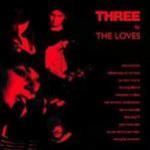
The Loves Three
(Fortuna Pop!)
Even with, or perhaps because of, the limitless possibilities of the Internet and the seemingly endless recommendations from the blogosphere, artists can tend to drop through the net. Take The Loves, who released their third album, the unimaginatively-titled Three, in May of this year to the glee of no-one in particular. In such situations, Wikipedia is the enterprising hack’s friend although we all know it isn’t exactly the most reliable of sources (either that, or the climate of Colombia actually is perfect for growing moon rocks).
The other problem with Wikipedia is that the pages for musicians tend to be written by obsessive fanboys since they’re the only people prepared to devote the necessary time to maintaining such a repository of information. So, it seems odd that the Wikipedia page for The Loves is - at the time of writing - hardly full of glowing praise. The Loves’ début album (Love) “attracted generally hostile press” and the band themselves have suffered “criticism from many reviewers and people in the music industry.” Be still, my beating heart…
Before even listening to Three, it’s already facing an uphill battle and you might want to bring your Big Book of 60s Influences along with you for when you press Play on the CD player. Be warned though, chances are you’ll contract cramp from furious ticking. The Loves do not seem to have one original idea between them, veering from hippie-pastiche to swirling-keyboard pop with little regard for invention. Perhaps more frustratingly though, is the deadpan delivery of the lyrics, suggesting an in-joke that you’re just not enough of a hipster to be party to.
And you know what? It’s absolutely brilliant.
No, really, it is. It may not be flawless and the constrained vocals can grate but the majority of Three is executed with enough knowledge and respect that it’s a worthy homage to its myriad influences. As a short-hand to describe the sound, imagine The Dandy Warhols, except… uh… well… good.
Opener One-Two-Three is irresistible rock and roll which pilfers the chorus from The Jackson Five’s ABC, Kaleidoscope (In My Head) races around like a marginally more focused Architecture in Helsinki, and Sweet Sister Delia is a power pop classic in the making. Despite the lack of originality, the melodies and the quality of the songwriting is so strong that its possible lack of artistic merit hardly seems to matter.
That’s a pretty controversial statement in some quarters but when all’s said and done, you like what you like and that’s how it should be. The concept of “guilty pleasures” shouldn’t even exist; it’s a creation of the indier-than-thou tastemakers but if you enjoy a piece of music, why feel guilty about it? No-one in the music world seems to be prepared to go out on a limb and say than anything Thom Yorke puts his name to is less than perfect or recognise just how fantastic a song Toxic by Britney Spears really is. So, if you can maybe abandon your principles a little, there’s a gem of an album in store for you.
Of course, there are downsides to Three: the main example being the cloying Everybody is in Love which strays so far into relaxed, it ends up with its feet in the next camp: comatose. Ode to Coca-Cola is as ill-advised as its title suggests and no-one wants to hear a song featuring burping as percussion.
Worth the admission price alone, however, is the penultimate track: Can You Feel My Heart Beat? Over a palpitating drum beat, a sparse Hammond organ plays a simple hook and female vocalist Jenna purrs her way through a seductive call to arms. It’s an effective track given room to breathe and has just the right amount of momentum to take it from one phrase to the next. You’ll wish you were the subject of Can You Feel My Heart Beat?, providing you don’t mind being described as “a motherfucking sweet-as-fuck panic attack” (and let’s face it, no sane person could object).
Not everybody can be as groundbreaking and inventive as Aphex Twin, but then again, you wouldn’t want everybody to be. If you can concentrate on what’s important - the actual songs - then you might just find one of the great underappreciated albums of the year. If that ends up being the case, maybe you could edit The Loves’ Wikipedia page; it could certainly do with some, well, love.
